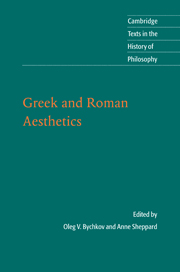Book contents
- Frontmatter
- Contents
- Preface
- Introduction
- Chronology
- Further reading
- Note on the texts and the translations
- Greek and Roman Aesthetics
- Gorgias
- Plato
- Xenophon
- Aristotle
- Philodemus
- Cicero
- Seneca
- Longinus
- Philostratus
- Philostratus the Younger
- Aristides Quintilianus
- Plotinus
- Augustine
- Proclus
- Index
- CAMBRIDGE TEXTS IN THE HISTORY OF PHILOSOPHY
Philodemus
Published online by Cambridge University Press: 05 June 2012
- Frontmatter
- Contents
- Preface
- Introduction
- Chronology
- Further reading
- Note on the texts and the translations
- Greek and Roman Aesthetics
- Gorgias
- Plato
- Xenophon
- Aristotle
- Philodemus
- Cicero
- Seneca
- Longinus
- Philostratus
- Philostratus the Younger
- Aristides Quintilianus
- Plotinus
- Augustine
- Proclus
- Index
- CAMBRIDGE TEXTS IN THE HISTORY OF PHILOSOPHY
Summary
On Poems 5
x.21–xii.9
… I accept entirely that a good poet differs from the one who merely writes well. For one can take an irrational story or subject and elaborate it poetically; there have been some poets like that. But the one who is also selective about his subject matter is thought to be a consummate good poet …
I accept that some who play the pipe are not good pipe-players and that this fact corresponds to my distinction between one who merely writes well and the good poet, and he is not quibbling when he brings in the musicians as witnesses that he is speaking the truth. He claims that making this distinction divides the matter in hand into two, and that the actual composition of poetry would be more, not less, important. I understand this to be the same as saying that perfect composition is more valuable than wealth of thought.
xiii.32–xv.17
Neoptolemus was wrong to separate stylistic arrangement from thought, while saying that it is neither more nor less important, as we have noted. He absurdly subdivides poetic art into (a) the person who has the skill and ability to write poetry, (b) the poem, and (c) poetry. How could that be? He ought rather to call the examples of composition ‘poetry’ or, better still, to call the ‘poems’ works and their ‘poetry’ something like the webs the poet weaves, and the one who has the skill and works with it ‘a poet’.
- Type
- Chapter
- Information
- Greek and Roman Aesthetics , pp. 109 - 116Publisher: Cambridge University PressPrint publication year: 2010

